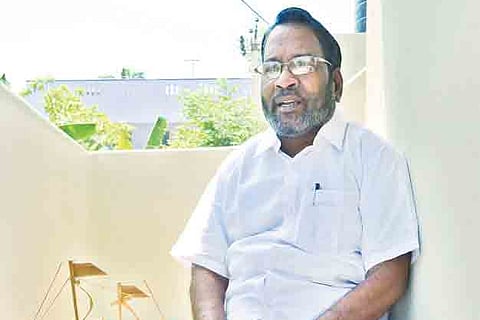

Reckoning that the phrase, ‘The destiny of the nation is decided in classrooms’ was popularised by first Vice-President of India Dr S Radhakrishnan, teacher -turned-social activist Professor I Elangovan says that society expects more from a teacher than just teaching. “A teacher should lead his/her life in such a manner, so that students can perceive their teacher as a role model,” Elangovan told City Express.
Born in a humble family with six siblings, Elangovan wanted a job that would keep him close to society.
After completing his post-graduation in English, he got an opportunity to work as an assistant professor, and in due course he rose to the position of Head, Department of English at Elizabeth Rodman Voorhees College, Vellore.
Starting from the year 1973, his teaching career spanned a mammoth 36 years. During his tenure as a teacher and leader of the teachers’ union, he spearheaded many protests pertaining to the welfare of teachers such as the JACCT (Joint Action Council of College Teachers) in 1985, All India Level Teachers’ Strike in 1987, strike at the Madras Christian College in 1993, and the protest against TESMA in the year 2003.
He was also the first one to file a case against TESMA. “I was imprisoned many times for spearheading and participating in such protests,” said Elangovan, who also served as the vice-president of the Association of University Teachers for a decade.
Elangovan’s scathing document on reservation in educational institutions in the State has also been published by Dalit Murasu as ‘Do Not Come To Us’ in English and Varuthappattu Baaram Sumappavargale in Tamil.
“I chose a total of 160 colleges across the State for the study. I got all the information through RTI, 2005. It was shocking to see that only a few colleges followed the reservation system for student admissions, and appointment and promotion of teachers. Even minority institutions seemed to shut the doors on Dalits when it came to reservation,” Elangovan said.
“But it was not the case earlier,” he says. India’s first Vice-President, Dr S Radhakrishan did his intermediate four years (1901-1904) in the then Arcot Mission College, which was later rechristened as Voorhees College at Vellore.
“Sarvapalli Radhakrishnan came from a village priest’s family. His education was supported by the missionaries, as in those days, the British gave merit grants to the schools which performed well. Using those grants, the school management used to admit children from socially and economically weaker sections. Such philanthropic services in education are not seen today,” he lamented.
Though his study was done in the year 2009, he affirms that the condition still persists. A public interest litigation (PIL), which was filed in this regard, is still pending in the Madras High Court.
Post retirement in 2009, Elangovan now practises as an advocate. The man, who taught several well-known personalities like writer Azhagiya Periyavan, poet Yaazhan Adhi, journalist Punitha Pandian and writer Gambeeran among others, states the major challenge teachers will meet in the future is being a good role model to their students.
“Che Guevera, Bhagat Singh, Thillaiyaadi Valliammai and many others are being perceived as role models by others because through living they have left a lesson,” concludes Professor Elangovan.